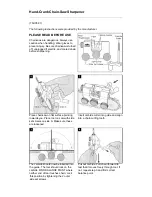
BOP-1K 031912
4-7
11. Set the BOP to zero volts output by sending
CAL:ZERO
. Disconnect the +10V d-c reference
voltage from the analog I/O port external reference pin (A2A5J6 pin 11) of the BOP, then
connect 0V ±0.1mV d-c reference voltage from the external voltage source to +V_LIM_EXT
(pin 14), –V_LIM_EXT (pin 6), +I_LIM–EXT (pin 13) and –I_LIM–EXT (pin 5) referenced to
pin 12 (GND1) of the BOP analog I/O connector (A2A5J6), then send the
CAL:VLIM ZERO
command. This
enables the BOP to recognize that the voltage at the ±VLIM_EXT pins is 0V.
12.Set the BOP to zero amperes output by sending
CAL:CLIM ZERO
. This enables the BOP to
recognize that the voltage at the ±I_LIM_EXT pins is 0V. Then send
CAL:ZERO
command.
13.C10.0V ±0.1mV d-c reference voltage from the external voltage source to
+V_LIM_EXT (pin 14), –V_LIM_EXT (pin 6), +I_LIM–EXT (pin 13) and –I_LIM–EXT (pin 5)
referenced to pin 12 (GND1) of the BOP analog I/O connector (A2A5J6), then send
CAL:VLIM MAX
. This enables the BOP to recognize that the voltage at voltage at the
±VLIM_EXT pins is 10.0V. Then send
CAL:ZERO
command.
14.Send
CAL:CLIM MAX
command. This enables the BOP to recognize that the voltage at the
+I_LIM_EXT pin is 10.0V. Then send
CAL:ZERO
command.
15.Set the BOP to minimum (maximum negative) output by sending
CAL:VLIM MIN
com-
mand. This enables the BOP to recognize that the voltage at the –VLIM_EXT pin is
10.0V. Then send the
CAL:ZERO
command.
16.Set the BOP to minimum (maximum negative) output by sending
CAL:CLIM MIN
com-
mand.This enables the BOP to recognize that the voltage at the –I_LIM_EXT pin is
10.0V. Then send the
CAL:ZERO
command.
17.Connect a 0V ±0.1mV d-c reference to pin 8 (S_IN_SERIAL) of the PAR/SER CONTROL IN
connector (A2A5J3) referenced to COM S terminal at the rear panel (use mating connector
supplied with the unit, P/N 142-0488 to gain access to PAR/SER CONTROL IN connector
pins). Set the BOP to zero volts output by sending
CAL:SER ZERO
. Connect the DVM to the
BOP OUT S and OUT COM terminals and send
CAL:DATA
commands as needed (see PAR.
4.3a) to adjust the BOP output until the DVM reads as close to zero as possible within toler-
ance specified in Table 4-3 for VOLTAGE ZERO.
NOTE: Accuracy of the 10V d-c reference must be ±0.1mV in order for the calibrated unit to
meet published specifications.
18.Connect –10V ±0.1mV d-c reference [–6V ±0.1mV d-c reference for BOP 6-125MG] to pin 8
(S_IN_SERIAL) of the PAR/SER CONTROL IN connector (A2A5J3) referenced to COM S
terminal at the rear panel. Set the BOP to maximum positive output voltage by sending
CAL:SER MAX
. Measure the voltage output using the DVM. Send
CAL:DATA
commands as
needed (see PAR. 4.3b) until the DVM reading is as close as possible to +10V [+6V for BOP
6-125MG].
19.Send
CAL:ZERO
to prepare for current calibration. After sending the command, the BOP out-
put will be set to zero volts. Refer to Figure 4-2 to connect the C terminals of the Kelvin type
sense resistor to the BOP and connect the DVM to the P (probe) terminals of the sense
resistor ((LO terminal of DVM to common P terminal). Table 4-4 provides recommended
sense resistor values for various BOP current outputs, as well as the formula for calculating
expected measured values and tolerances for any sense resistor other than those recom-
mended. Table 4-2 lists Kepco and Manufacturer part numbers for those sense resistors rec-
ommended.
Summary of Contents for BOP-MG
Page 2: ......
Page 10: ......
Page 20: ...x BOP 1K 031912 FIGURE 1 1 HIGH POWER BOP SERIES POWER SUPPLY...
Page 37: ...BOP HIPWR 031912 1 17 FIGURE 1 3 BOP OUTPUT CHARACTERISTICS...
Page 53: ...BOP HIPWR 031912 2 15 FIGURE 2 4 PARALLEL CONFIGURATION LOCAL SENSING TYPICAL...
Page 54: ...2 16 BOP HIPWR 031912 FIGURE 2 5 PARALLEL CONFIGURATION REMOTE SENSING TYPICAL...
Page 64: ......
Page 132: ......
Page 192: ......
















































